
Healthy eating would be a lot easier if someone cleaned out our fridge for us. But it is not as difficult as it seems with my gutlove pantry guide- if high fat, high salt and low fiber choices are out of sight then they are out of mind.

Healthy eating would be a lot easier if someone cleaned out our fridge for us. But it is not as difficult as it seems with my gutlove pantry guide- if high fat, high salt and low fiber choices are out of sight then they are out of mind.
Bananas pack a nutritional punch as they are rich in potassium. Potassium is an essential mineral in maintaining normal blood pressure and an important component in cardiovascular health. They have a unique mix of vitamins and minerals and provide low glycemic carbohydrates making them ideal for athletic performance. Additional health benefits may include lowering the risk of certain cancers and asthma and promoting regularity.
note: people who are taking beta-blockers should be conscious of high potassium foods as beta blockers tend to increase potassium in the blood. Consult with your doctor about regulating and monitoring your potassium levels.
1 small banana:
Vitamin B6: 25% DV
Manganese: 16% DV
Vitamin C: 14% DV
Potassium: 12% DV
Fiber: 12% Dv
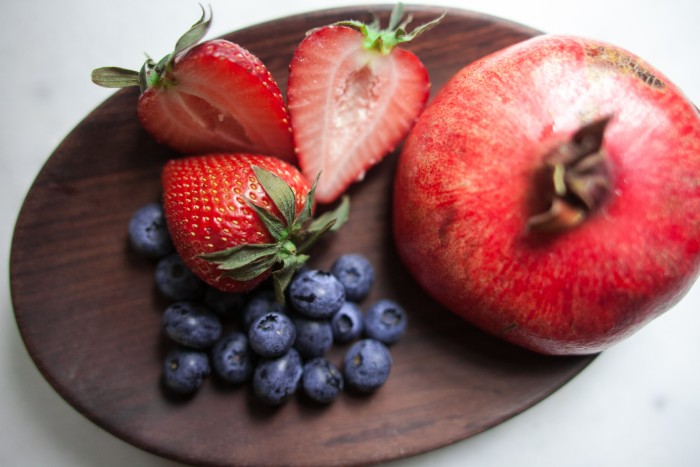
Strawberries are rich in antioxidants and anti-inflammatory nutrients including quercetin, anthocyanins and polyphenols. They are also rich in the essential nutrients folic acid, fiber and vitamin C. One cup of fresh strawberries provides 160% of your daily vitamin C needs. They have been shown to support cardiovascular health, improve regulation of blood sugar, as well as prevent certain cancers. They are a go to treat in my family in smoothies or diced and served with yogurt or a summer salad.
1 cup:
Vitamin C: 113% DV
Manganese: 28% DV
Fiber: 12% DV
Iodine: 12%
Folate: 9% DV
Potassium: 6% DV
Magnesium: 5% DV
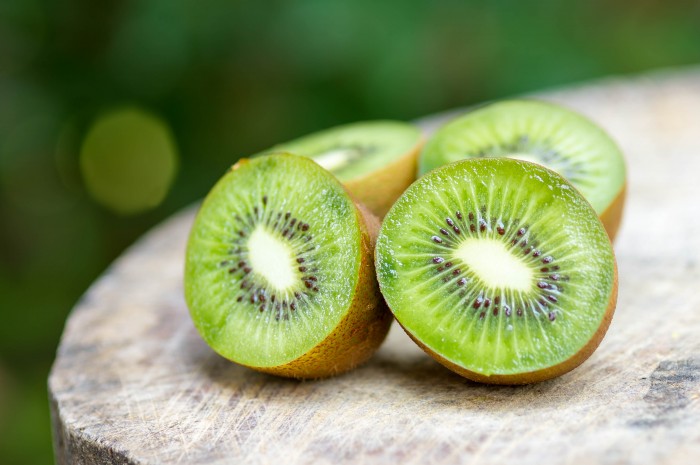
Kiwis are a nutrient dense food meaning they are high in nutrients but low in calories. They are rich in antioxidants, vitamin C, fiber and potassium. Vitamin C is a water soluble vitamin that neutralizes those icky free radicals that cause damage to cells. The possible benefits of consuming kiwis and many other fruits includes a reduced risk for heart disease, diabetes, obesity and some cancers.
1 cup:
Vitamin C: 85% DV
Vitamin K: 31% DV
Copper: 10% DV
Fiber: 8% DV
Vitamin E: 7% DV
Potassium: 6% DV
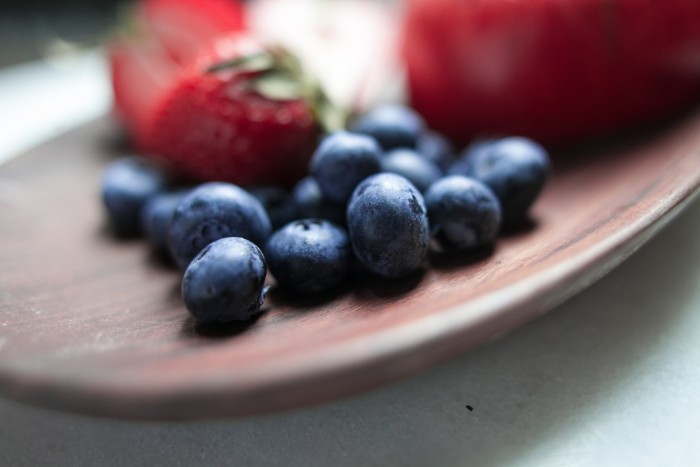
These are rich in the flavanoid, anthocyanin and the polyphenol, quercetin that contribute to a host of their health benefits. They are rich in iron, phosphorous, calcium, zinc and vitamin k that contribute to building and maintaining bone strength. Blueberries have been shown to improve heart health, cognitive function, regulate blood sugar levels, improve digestion, fight wrinkles and contain anti-cancer benefits. I like to incorporate these nutrient dense berries to my smoothies with some protein powder and almond milk.
1 cup:
Vitamin K: 32% DV
Manganese: 25% DV
Vitamin C: 19% DV
Fiber 14% DV
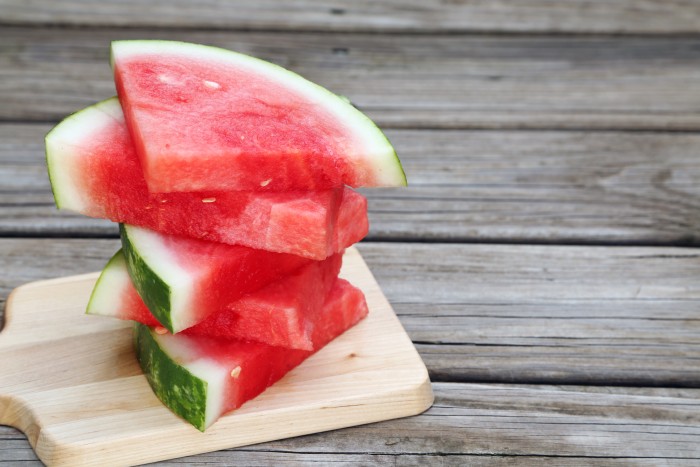
Watermelons are synonymous with summer and help to quench your thirst after a workout. They are rich in anti-inflammatory compounds and provide antioxidant support for cardiovascular health. They are rich in lycopene, zinc, choline,copper, vitamin B6, vitamin A, potassium, and vitamin C. The antioxidant beta carotene provides eye health and heart health. Consuming watermelon can contribute to overall improved digestion and regularity, improved hydration, reduced inflammation and muscle soreness and improved skin texture due to its high vitamin A content. I like to make watermelon and mint juices for extra hydration after a long workout.
1 cup:
Vitamin C: 16% DV
Pantothenic Acid: 7% DV
Copper: 7% DV
Vitamin A: 5% DV
Biotin: 5%DV
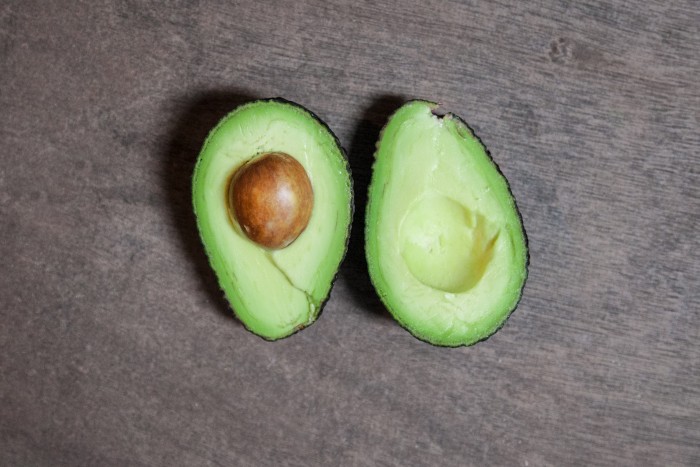
These are rich in monounsaturated fats (the healthy fat) that provide a wide range of anti-inflammatory benefits. Similar to all fresh fruits they are nutrient dense as well. They are rich in the carotenoid family that provide protection for the heart and eyes, promote blood sugar regulation, may prevent osteoporosis because of their high vitamin K content and improve digestion and regularity.
I add them to my salads or smoothies for a dose of my daily good oils or make a homemade guacamole.
https://iquitsugar.com/recipe/super-speedy-guacamole/
1 cup:
Pantothenic Acid: 42% DV
Fiber: 40% DV
Vitamin K: 35%
Copper: 31% DV
Folate: 30% DV
Vitamin B6: 23% DV
Vitamin E: 21% DV
Potassium: 21% DV
Vitamin C: 20% DV
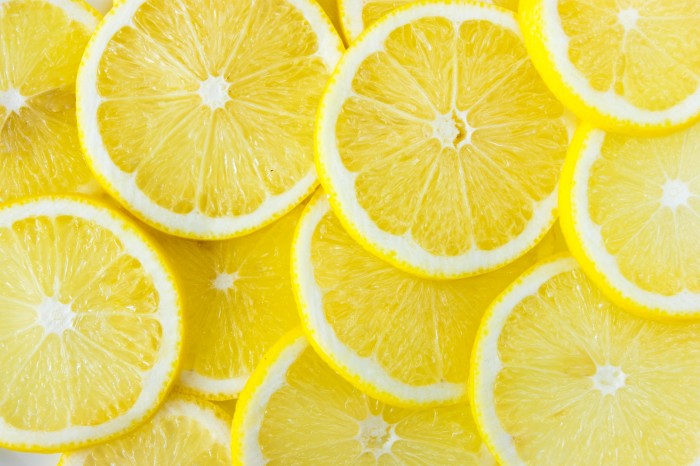
Lemons are rich in phytonutrients and provide an antibiotic affect on our body. They are rich in vitamin C that is the main antioxidant in our body. Vitamin C is a water-soluble vitamin that neutralizes free radicals present in our body. Vitamin C supports a strong immune system so it is helpful in fighting colds, flus and ear infections.Additionally, they help to maintain a healthy complexion because of their vitamin C content which plays a vital role in collagen formation, they increase iron absorption when combined with iron rich foods (spinach or chickpeas) and may prevent asthma. Lemons increase detoxification in the body because it activates the release of bile which acts as an emulsifier for fat and removes fat soluble toxins.
I squeeze lemon juice and some of the zest into a warm glass of water every morning for digestive health and my daily dose of vitamin C.
¼ cup:
Vitamin C: 31% DV
Folate: 3% DV
I use coconut flour because it is gluten and wheat free. It is also rich in dietary fiber, derived from coconuts that are rich in MCFAs, safe for diabetics, and rich in protein. There are 5 grams of fiber per tablespoon, and most of it is insoluble fiber. Insoluble fiber adds bulk to your stool and helps you feel fuller. As a result of the high fiber content, it does not affect blood sugar levels as quickly as grain-based flours. Coconut flour is used by people following the paleo diet, the GAPS or SCD diet, or any grain-free diet.
I add it to my baked goods and sauces for thickening. However, you cannot substitute coconut flour for wheat flour or any other grain based flour at a 1:1 ratio. Coconut flour is highly absorbent, so I generally substitute ¼ cup to 1/3 cup for 1 cup of grain-based flour, as well as incorporate more eggs. For every one cup of coconut flour, I add 6 beaten eggs – but to make life easier, I try to find recipes that call for coconut flour, or come up with my own concoctions.
Coconut flour can be found in any health food store.
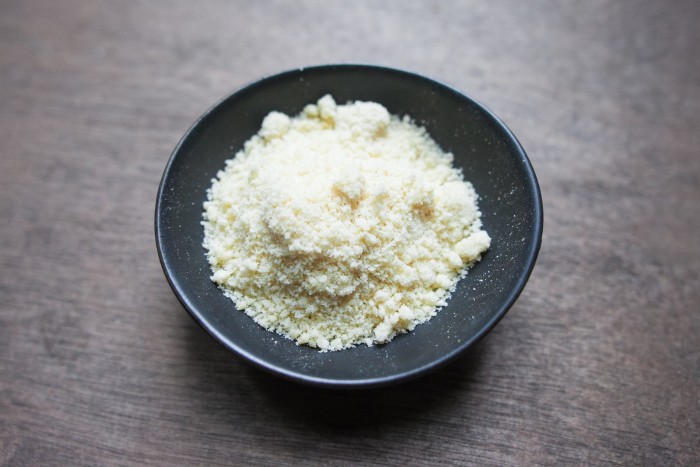
Almond flour is high in protein and low in carbs and sugar, so it is a good alternative for anyone watching their glycemic index. Almonds are also rich in monounsaturated fats. Almonds are also high in Vitamin E, magnesium, and potassium. Magnesium is a highly underrated mineral that many of us are deficient in.
I use almond flour in all of my baked goods. The finer the almond flour, the better your baked goods will turn out. Also, nut flours tend to burn easily, so I will sometimes bake at a lower temperature for a longer period of time if the original recipe calls for wheat flour.
Almond flour can be found in any health food store.
This is an incredible source of medium chain fatty acids (MCFA’s). Most of the fats we consume are long chain fatty acids that need to be broken down first before they are absorbed. MCFA’s are easily digested because we do not need to break them down. Instead they are sent directly to the liver for energy production. As a result, your body does not need to produce bile or pancreatic enzymes to digest the fat. This makes it perfect for diabetics and people suffering from gall bladder issues.
It also contains lauric acid. This is converted to monolaurin in the body and is useful in fighting viruses and diseases.
Our bodies need saturated fat for cell function and growth. Studies are not conclusive that saturated fat causes heart disease. This is truly a go to fat in your diet as the anti-microbial, anti bacterial and antifungal properties in addition to the nutrient content are so nourishing!
This is my go to cooking oil but I also use it in smoothies for a little extra flavor.
This can be found in any health food store.
Serving Size: 1 tablespoon
Fat: 14g
Carbs: 0g
Protein: 0g
100% fat, 0% carbs, 0% protein
This is very different than palm kernel oil and should not be confused. Red palm oil if rich in Vitamin A and E. The health benefits are achieved due to the red color of the palm fruit that contains carotenes, including beta-carotene and lycopene. It is also loaded with antioxidants, tocopherols and tocotrienols (Vitamin E). There is scientific evidence indicating it plays a beneficial role in fighting heart disease and high cholesterol. Similar to coconut oil it is a MCFA but it is the high antioxidant levels that make this another go to fat for your diet.
This can be found in any health food store.
Serving Size: 1 tablespoon
Calories: 130
Carbs: 14g
Carbs: 0g
Protein: 0g
100% fat
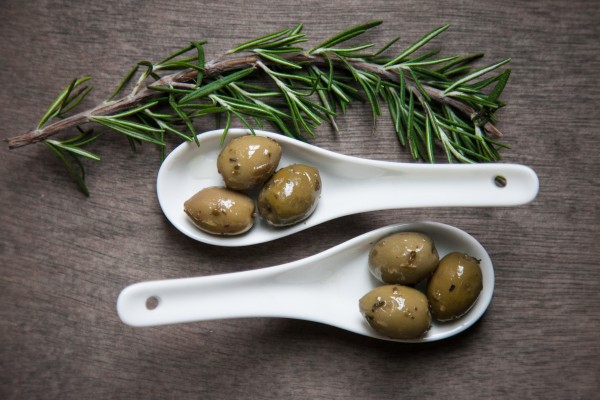
This is rich in monounsaturated fat. Studies indicate that consuming monounsaturated fats is attributed to a decrease in cardiovascular disease, including hypertension, stroke and hyperlipidemia (high blood cholesterol and triglyceride levels). It is helpful in reducing inflammation and facilitates carbohydrate metabolism.
I do not cook with olive oil as it has a low boiling point but instead use it on salads, in smoothies and for dipping. Coconut oil and red palm oil have higher boiling points than olive oil.
Serving Size: 1 tablespoon
Calories: 119
Fat: 13.5g
Carbs: 0g
Protein: 0g
100% fat
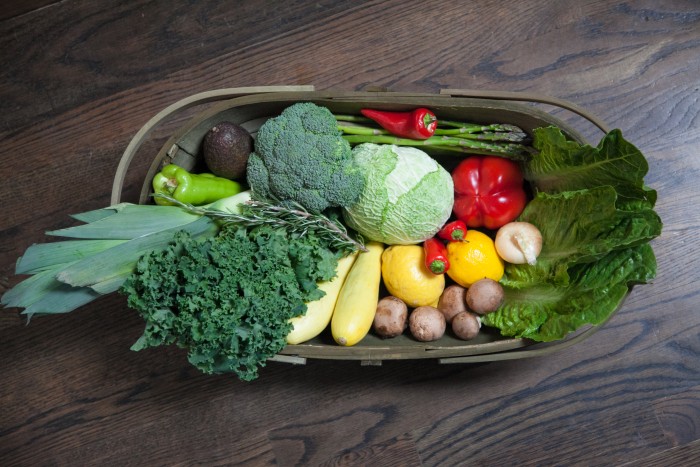
Remember Popeye? Studies show that consumption of spinach can be helpful in reducing the risk of prostate cancer. It is rich in health promoting phytonutrients that provide antioxidant benefits. Spinach is also high in oxalic acid, so it can be helpful to boil it for a minute to reduce the levels of acidity.
1 cup provides:
Vitamin K: 987% DV
Vitamin A: 106% DV
Manganese: 84% DV
Iron: 36% DV
Copper: 34% DV
Vitamin B2: 32% DV
Vitamin B6: 26% DV
Vitamin C: 14% DV
Vitamin E: 25% DV
Calcium: 24% DV
Potassium: 24% DV
Fiber: 17% DV
Bell peppers are an excellent source of carotenoids, especially beta-carotene and zeaxanthin, and are high in vitamin C (even more than oranges). They contain anti-inflammatory properties and provide anti-cancer benefits.
1 cup provides:
Vitamin C: 157% DV
Vitamin B6: 16%
Vitamin A: 16%
Folate: 11%
Vitamin E: 10%
Not all lettuce is created equal! Romaine is high in vitamin K and vitamin A, and packed with other vitamins, minerals, phytonutrients, and fiber. This is a heart healthy addition to any meal, as it can help prevent the oxidation of cholesterol. The high folic acid content is beneficial for converting bad homocysteine (contributes to heart disease) into a benign substance.
2 cups provide:
Vitamin K: 107% DV
Vitamin A: 45% DV
Folate; 32%
Molybdenum: 13% DV
Vitamin C: 5% DV
Potassium: 7% DV
Manganese: 8% DV
Beets contain phytonutrients called betalains. They provide anti-inflammatory and detoxifying support.
1 cup provides:
Folate: 34% DV
Manganese: 28% DV
Potassium: 15% DV
Copper: 14% DV
Tomatoes are rich in lycopene and antioxidants, and are known to support bone health. Studies show that tomatoes are also linked with heart health because they contribute to lowering total cholesterol, LDL cholesterol, and triglycerides.
1 medium-sized whole tomato provides:
Vitamin A: 20% DV
Biotin: 24% DV
Vitamin K: 16% DV
Vitamin C: 28% DV
Vitamin B6: 5% DV
Magnesium: 5% DV
Potassium: 292mg
Mushrooms provide immune support, as well as anti-inflammatory and antioxidant benefits. They are rich in B vitamins, which provide homocysteine regulation and thus, cardiovascular health.
I add my mushrooms to stir fry or sauces for the kiddos to enjoy.
1 cup:
Copper: 40% DV
Selenium: 35% DV
Vitamin B2: 27% DV
Pantothenic Acid: 22% DV
Vitamin B3: 17% DV
Phosphorous: 12% DV
Potassium: 9% DV
Zinc: 7%
Vitamin B1: 6%
Zucchini is a rich source of antioxidants and helps regulate blood sugar levels with anti-inflammatory benefits. Studies indicate they support a healthy prostate and provide anti-cancer benefits as well.
I add grated zucchini to my sauces, or grill them with a little olive oil.
1 cup:
Copper: 21% DV
Manganese: 19% DV
Vitamin C: 13% DV
Magnesium: 11% DV
Fiber: 10% DV
Phosphorous: 10% DV
Potassium: 10% DV
Folate: 9% DV
Vitamin B1: 7$ DV
Vitamin K: 7% DV
Vitamin B6: 7% DV
Vitamin B3: 6% DV
The health benefits of broccoli are far reaching. They provide cancer protection, contain anti-inflammatory properties, and protect against oxidative stress. The high fiber content provides digestive support.
I add broccoli to my stir fry, or just steam it and add a little butter.
1 cup:
Vitamin K: 245% DV
Vitamin C: 135% DV
Chromium: 53% DV
Folate: 42% DV
Fiber: 21%DV
Pantothenic Acid: 19% DV
Vitamin B6: 18% DV
Vitamin E: 15% DV
Phosphorous: 15% DV
Manganese: 15% DV
Choline: 15% DV
Vitamin B2: 15% DV
Vitamin A: 13% DV
Potassium: 13% DV
Kale is a powerhouse vegetable that is rich in antioxidants and anti-inflammatory properties. Kale contains glucosinolates that provide cancer preventative benefits, as well as cardiovascular support. It can be helpful in detoxifying the body too!
I like to use it in my juices or add it to sauces.
1 cup:
Vitamin K: 1180% DV
Vitamin A: 98% DV
Vitamin C: 71% DV
Manganese: 27% DV
Copper: 22% DV
Vitamin B6: 11%DV
Fiber: 10% DV
Calcium: 9%DV
Potassium: 8%DV
Iron: 7% DV
Vitamin E: 7%DV
Vitamin B2: 7%DV
Magnesium: 6%DV
Vitamin B1:6%
Protein: 5%
Phosphorous: 5% DV
Eggplants are rich in the phytonutrient nasunin, a potent antioxidant that prevents cells from oxidative damage. It also provides cardiovascular support by reducing cholesterol levels. I like to make grilled eggplant or baba ganoush to serve with sliced veggies.
1 cup:
Fiber: 10% DV
Copper: 7% DV
Vitamin B1: 7% DV
Manganese: 6% DV
Vitamin B6: 5% DV
Vitamin B3: 4% DV
Potassium: 3% DV
Cucumbers are rich in three phytonutrients: flavonoids, lignans, and triterpenes. These all provide antioxidant, anti-inflammatory, and anti-cancer benefits.
I like to use them in my juices for hydration and detoxification, as well as cut up to be served with hummus or baba ganoush.
1 cup:
Vitamin K: 19% DV
Molybdenum: 12% DV
Pantothenic Acid: 5% DV
Potassium: 4% DV
Phosphorous: 4% DV
Copper: 4% DV
Manganese: 4% DV
Vitamin C: 4% DV
Vitamin B1: 3% DV
Now that you are on board with a whole foods diet, let’s incorporate some spices to your grocery basket! Maybe you avoid the spice aisle because it seems overwhelming, but here are three spices that pack a punch to any dish – and supply healthy benefits to any kitchen.
Turmeric has been used for thousands of years in India and China because of its healthy benefits. Turmeric is a medicinal spice that contains Curcumin, a pharmacological agent that has powerful antioxidant benefits, proven to be helpful in treating arthritis, heartburn, stomach pain, intestinal gas and bloating, headaches, colds, and menstrual problems. Its properties have been proven to be as effective as hydrocortisone and Motrin for treating inflammation.
Turmeric can be a well tolerated alternative in treating inflammatory bowel disease (IBD), which includes, but is not limited to Crohn’s disease and ulcerative colitis.
Curcumin has also been touted as having cancer preventative properties. The antioxidant properties protect against the free radicals that can damage cells.
Last but not least, turmeric can improve liver function and contribute to lowering cholesterol levels.
It can be added any sauce, or I like to grate fresh turmeric and add it to my smoothies in the morning – to start the day with a quick jolt of that caffeine feeling, but without the caffeine!
http://simplegreensmoothies.com/green-smoothie-recipes/tropical-turmeric-cleanser
It can be found in the grocery aisle of any health food store.
A quarter cup of pumpkin seeds contains half the recommended daily amount of magnesium. This mineral is important for proper bone formation, relaxation of blood vessels, and the production of proteins. These seeds are also a rich source of zinc (that supports immune function) and a rich source of omega-3 fats. They are an important food for men and prostate health. In addition, they are loaded with tryptophan, an amino acid that your body converts to serotonin, which then turns into melatonin for a restful night’s sleep. I like to throw these in salads or in with roasted vegetables.
Serving Size: ¼ cup
Calories: 190
Fat: 16g
Carbs: 1g
Protein: 10g
77% fat, 2% carbs, 21%protein
Cashews are rich in copper, manganese, phosphorous, and vitamin K. These vitamins and minerals help to diminish frequency of migraines, lower blood pressure, protect against heart disease, and provide bone strength. They contain NO cholesterol. They contain oleic acid, which is also found in olive oil – both are good for you!
Serving Size: 1 oz.
Calories: 157
Fat: 12.4g
Carbs: 8.56g
Protein: 5.17g
66% aft, 22% carbs, 12% protein
Goji berries is both a fruit and an herb and an excellent source of antioxidants. They are loaded with beta-carotene that promotes healthy skin. They are also high in fiber that contributes to regular bowel movements. There are claims that it is a remedy for diabetes, hypertension, malaria and fever. You can eat them raw or soak them before eating. I eat these plain or mixed with cashews. They are also a nice addition to any smoothie.
They can be found at any natural food store or even online.
Millet is high in copper, phosphorous, manganese and magnesium. It is one of the easiest digestible grains and acts as a prebiotic that feeds the inner bacteria in your gut. It is high in fiber and low in simple sugars. This is an amazing source of protein for vegans and non-vegans.
It is important to soak all your grains for atleast 8 hours to remove the phytic acid. Phytic acid when eaten binds to the minerals zinc, iron, calcium, magnesium, chromium and manganese in the gut unless it is soaked. Our body does not produce the enzyme necessary to break down phytic acid. Soaking them will remove the phytic acid which plays an essential role to the plant as a vital energy source but is considered an anti-nutrient for us. The minerals mentioned above will become bound to phytic acid if the grain is not soaked. Bound minerals can not readily be absorbed in the body and can result in mineral deficiencies.